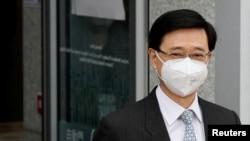Experts say Hong Kong’s only endorsed candidate for upcoming leadership elections is likely to take a harder-line approach on the city’s freedoms than outgoing Chief Executive Carrie Lam.
John Lee, Hong Kong’s former second-highest ranking official, issued a 44-page manifesto Friday in which he vowed to enact a long-shelved draft law supported by Beijing that aims to protect against security threats, increase the city’s competitiveness and build an inclusive society focused on upward mobility.
The former security chief’s candidacy received backing from more than half the 1,454-member election committee, consisting mostly of pro-Beijing politicians or members of China’s national committee with Hong Kong residency. This committee — comprising about 0.02% of the city’s 7.5 million population — is the only body that elects the next leader for the embattled international hub.
Lee has also been favored by Beijing for his heavy-handed approach to dissent, according to Samuel Chu, president of U.S.-based Campaign for Hong Kong.
“Beijing has a history of valuing those who can exercise a heavy hand to suppress protests and dissent,” Chu told VOA in an email.
Lee resigned as chief secretary for administration earlier in April to run in the upcoming elections. Before becoming a government official, Lee spent most of his career in the police force and is known for his tough stance against protesters, especially during the 2019 anti-government demonstrations.
“As a former police and security chief, Lee is the logical head to a structure that is fully and totally governed under the national security law and Beijing,” said Chu. “The chief executive role is no longer one that in any way represents or speaks for Hong Kongers’ interests and well-being. It makes perfect sense to put a [former] police [officer] in charge of a police state.”
Who is Lee?
John Lee Ka-chiu, 64, began his career as a police officer in 1977, before becoming the city’s top security official from 2017 to 2021. In the lead-up to the largest pro-democracy protests in the city in 2019, Lee helped the government push through the contentious extradition bill that could send Hong Kongers back to China for trial by reassuring the proposed law would not extradite for crimes linked to political opinions.
After waves of protest, Lam and Lee in 2019 both issued public apologies before withdrawing the extradition bill. Lee vowed to “take into account” views and opinions “for the benefit of the whole of Hong Kong.”
Earlier this year, however, he described protests as attacks on government rule resulting from “foreign interference.” Under his leadership as the city’s No. 2 official, Hong Kong police generated increasing support from Beijing as their crackdown on protesters became more severe, largely alienating members of the public.
“Avoiding political unrest and social instability is all the more important to Beijing in the ... run-up to the 20th Party Congress and Xi’s anointment for a third term,” according to Jacques deLisle, director of the University of Pennsylvania’s Center for the Study of Contemporary China. DeLisle described it as “imperative” that Xi not have a “Hong Kong-centered embarrassment” on his hands.
Also on the horizon is the 25th anniversary of Hong Kong’s handover by Britain, whose July 1 festivities will mark the halfway point of the “one country, two systems” arrangement.
As anticipation for the so-called second handover ramps up, so too does the “PRC’s paranoia about foreign interference ... with Hong Kong as a focal point and with criticism of China over its alignment with Russia over Ukraine,” said deLisle.
Lee voiced full support for Beijing’s implementation of the national security law in June 2020, and two months after, allegedly made the decision to force the shuttering of the city’s largest pro-democracy newspaper, Apple Daily.
In the same month, along with 10 other top officials in Hong Kong, Lee was sanctioned by Washington for “being involved in coercing, arresting, detaining, or imprisoning individuals under the authority of the National Security Law, as well as being involved in its development, adoption, or implementation.”
Stauncher stance on dissent
Faced with possible risk of crossing “red lines” in its coverage of the upcoming elections, Hong Kong’s Foreign Correspondents’ Club suspended its Human Rights Press Awards in late April, citing “significant areas of uncertainty.”
Maya Wang, senior China researcher for the U.S.-based Human Rights Watch, told VOA that she anticipates freedoms in Hong Kong “will continue their sharp decline” under Lee’s leadership.
“It’s clear that Beijing wants Lee to punish Hong Kong people for their perceived disobedience to Beijing,” she said via email. "Lee’s tenure [as Hong Kong’s second-highest political official] was marked by police brutality and a lack of accountability for the police officers who used excessive force during the 2019 protests.”
On Friday, Lee vowed to “fulfill the constitutional responsibility of legislation” under Article 23 of the Basic Law, which stipulates that the city shall enact its own laws to prohibit “any act of treason, secession, sedition, subversion against the Central People’s Government,” as well as “theft of state secrets.”
Both deLisle and Chu expect Lee to adopt a hardline approach once in office.
“A principal reason Carrie Lam was not in a position to run for a second term was the sense that she handled the crises that have beset Hong Kong poorly,” deLisle told VOA.
Chu painted a more detailed picture.
“When the police can operate on the streets with impunity, and the courts are no longer independent, Lee will be emboldened to act and speak in ways that Lam was never able to,” said Chu.
Lee will become the next chief executive if he receives a majority of the votes during the election.
The new Hong Kong leader will take office July 1.
Some information in this report came from The Associated Press





